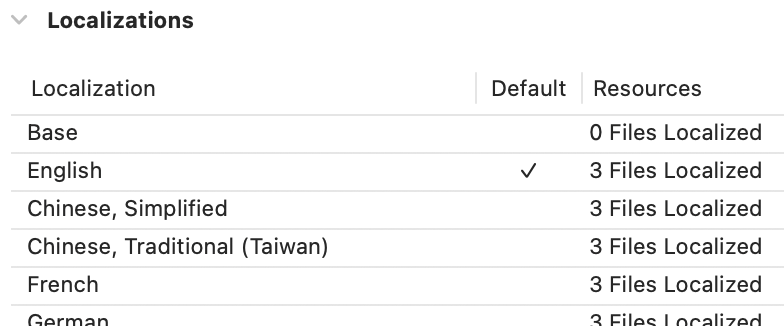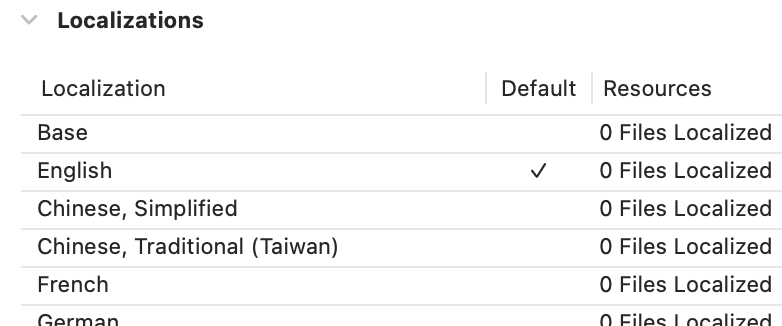A few weeks ago we got bit by a piece of Apple magic in its localization
workflow when combined with Swift PM. The problem we ran into was that as soon
as we moved all our Localizable.strings files to an SPM package, none of the
localizations would be picked up anymore and the app would display in
English—but only for first-time installations. We followed the
documentation guidelines for how to localize an app in an Swift PM environment
and have no custom tooling in place, so it was a bit of a headscratcher.
The modern way of adding support for another language/region in Xcode is through the project's Info tab. Simply click the + and add a language and the app now supports localizing in that language.
Adding localizations for any resource is done by clicking the Localize...
button in the Attributes inspector. After confirming the language, Xcode creates
a new .lproj folder for the selected language and moves the resource into that
folder. The end result is the project will have a .lproj folder for each
localization as well as the Base.lproj.
This just works. The .lproj folders get copied over to the .app and at
runtime the SDK knows how to read and use these folders. Xcode also gives visual
confirmation in the Info tab by indicating for how many files it has picked up
a localized version per language/region.

Getting started with adding some SPM packages in our app, we moved the .lproj
folders into our Localization package at
Localization/Sources/Localization/Resources/, which follows the process
outlined in the documentation. Locally this seemed to work and we shipped the
change, only for QA to report localizations were broken throughout the app.
As it turns out, any .lproj folders in SPM packages aren't considered when
determining what localizations are available. At first this was a bit confusing,
but it makes sense for two reasons:
- Through various layers of abstraction, the system looks up the available
localizations using methods on
Bundle.Bundle.localizationssimply finds all.lprojfolders in that bundle. SPM package bundles aren't included inBundle.main, which is the bundle that's used to determine app-wide localizations. - An SPM package can be localized in different languages than the app that integrates the package, especially if the package is from an external vendor. It could be weird behavior to have the app's selected localization be determined by some SPM package.
Note
There is an Info.plist key that would allow SPM packages to use a different
localization than the main app: CFBundleAllowMixedLocalizations.
I haven't tried for myself, but setting this to YES allows different
localizations for the app and for every package.
When moving all .lproj folders into the SPM package, the app didn't have any
localized files left and Xcode indicated as much.

As a result, the app would always default to English. This explained why things were broken but there were still a few questions left.
How come the correct localization was used for returning users?
This issue only happened to users that freshly installed the app. Upon first
launch, we store the user's locale in UserDefaults (later giving users the
ability to override this manually). Instead of reading strings from
Bundle.main we read them from a new Bundle instance specifically scoped to
that locale:
1 2 3 4 5 6 | |
This setup has some interesting results:
- ❌
Bundle.main.preferredLocalizationsonly contains the development default localeenas the main bundle doesn't have any localizations - ❌
customBundle.preferredLocalizationsonly contains the localization it was scoped to - ✅
customBundle.localizedString(forKey:value:table:)works as the SPM package's resources still get copied into the main app as a separate bundle - ✅
Bundle.module.preferredLocalizationscorrectly returns all the supported localizations since they're defined in the SPM package - ✅
Bundle.module.localizedString(forKey:value:table:)works for the same reason - ❌
Bundle.main.localizedString(forKey:value:table:)does not work as the main bundle doesn't have any localizations
For first-time users we would read en as their preferred language through
Bundle.main.preferredLocalizations, but for returning users we'd read what
language they were using before from UserDefaults.
Conclusion: we should be using Bundle.module.preferredLocalizations instead.
Why was it so difficult to figure this out?
The build cache in Xcode messed with our ability to reproduce the issue. In understanding what commit introduced the problem, we would often switch branches but that didn't invalidate the build cache.
So building any commit before the offending change would copy the .lproj
folders into the main app's build cache, and those folders would stay there
after checking out and building the offending commit.
At first we thought the issue was only intermittently reproducible, but once we realized the build cache was "polluted" we started to clean it every time. This made it much easier to reproduce but much slower to test due to constantly doing full builds.
What am I supposed to do in a fully modularized app where there are no files to localize in the main app?
In theory, using Bundle.module everywhere would work as highlighted above.
However, that's pretty cumbersome and there's a nicer way:
CFBundleLocalizations. This is another Info.plist key that lets you
explicitly define what localizations the app handles, instead of looking for
.lproj folders and implicitly supporting the localizations for the folders
Xcode finds. With that key set, Xcode still does look for these folders but now
it also considers SPM bundles, fixing the issue.
Finally, there's another way to be explicit about the localizations a project
supports: by adding a localization through Xcode's Info tab. This sets the
knownRegions value in the Xcode project file, which is not only considered for
determining what localizations to consider at build time, but is also used to
export and import xliff files.
That would have fixed our issue as well, but I personally prefer to not touch
the project file as much as possible and be explicit about what localizations
are supported through CFBundleLocalizations.